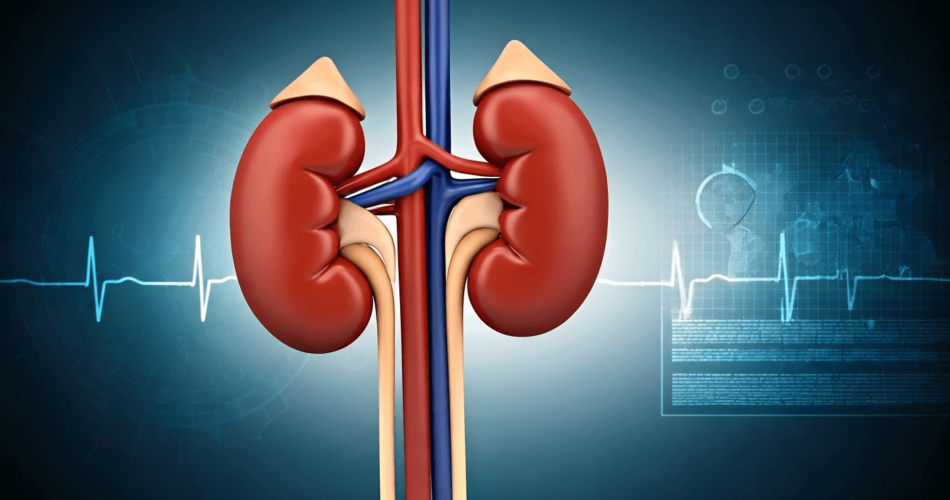Key Highlights
- Kidney failure, a serious condition where kidneys can’t filter waste from blood, can be acute or chronic.
- Early detection is crucial, but symptoms often appear late, making awareness vital.
- Common signs include fatigue, shortness of breath, urination changes, and swelling in extremities.
- Other signs encompass muscle cramps, persistent itching, and changes in urine appearance.
- If you experience these symptoms, especially if you’re in a high-risk group, consult a doctor immediately.
Introduction
Kidney failure is a serious problem. It happens when your kidneys can’t filter waste products out of your blood effectively. Early signs of kidney disease can be hard to notice. That’s why it is important to recognize warning signs early. This will help you get the care you need. In this blog post, we will look at seven important symptoms of kidney failure, affecting many Australians. You should never ignore these symptoms. By knowing them, you can help take care of your kidney health.
7 Key Symptoms of Kidney Failure Not to Overlook
Recognizing the early signs of kidney failure can be hard. This is because the symptoms may look like other health issues. However, knowing these warning signs and acting quickly can really help your kidney health.
In this blog, we will look at seven important symptoms: severe muscle cramps, shortness of breath, constant itchiness, foamy or bloody urine, changes in urination patterns, fatigue and weakness, and swollen ankles and feet. Understanding these symptoms can help you take steps to improve your well-being.
1. Severe Muscle Cramps
Muscle cramps can signal an imbalance of electrolytes. This often happens in kidney failure because the kidneys can’t keep the right amounts of minerals in your blood. When kidney function is not good, waste products build up. This leads to an imbalance of electrolytes like potassium, calcium, and magnesium. These minerals are important for muscles to work properly.
When the balance is off, it affects how muscles contract and relax, causing painful cramps. Muscle cramps can also happen for other reasons, such as dehydration or overuse. However, if they happen often and come with other symptoms, you should see a doctor right away.
If you get bad muscle cramps frequently, especially if you have other risk factors for kidney disease, it’s important to talk to your healthcare provider. They can help with the right diagnosis and care.
2. Shortness of Breath
Shortness of breath, called dyspnea, can be a sign of kidney failure. It often means extra fluid is building up in the lungs. When the kidneys can’t get rid of this extra fluid, it may collect in different parts of the body, including the lungs, which leads to breathlessness.
This symptom may also point to heart failure, a possible problem linked to kidney disease. The kidneys and heart work closely together. If kidney function is weak, the heart has to work harder. This can raise the chance of heart issues.
If you feel unexplained shortness of breath, especially when you are active or lying down, make sure to see a healthcare professional. It is important to check for any heart or kidney problems.
3. Persistent Itchiness
Persistent itchiness, known as pruritus, can happen in the later stages of chronic kidney disease (CKD) and renal failure. When kidney function decreases, the kidneys can’t filter toxins from the blood properly. This leads to toxins building up, which can irritate the skin and cause constant itching.
Though dry skin often causes itching, the itching from kidney failure can be stronger and spread over a larger area. It might be especially bothersome at night and can affect your sleep. Also, scratching to ease the itch can harm the skin more and raise the risk of infections.
To deal with persistent itching, it is important to manage the kidney disease and to find ways to lower the buildup of toxins. If you feel ongoing itchiness, especially along with other symptoms of kidney disease, it’s essential to talk to your healthcare provider.
4. Foamy Or Bloody Urine
Changes in the way urine looks, like being foamy or having blood, can be early signs of kidney problems. Foamy urine shows there might be extra protein in it. Healthy kidneys filter out waste products and keep protein in the blood. But when the kidneys are damaged, they might let protein leak into the urine.
Blood in the urine, called hematuria, can also mean there is a problem in the urinary tract, including the kidneys. Even though it can be scary, not every case of hematuria is serious. Still, it’s important to see a doctor to find out why it happens. The cause could be anything from infections to kidney stones or, sometimes, kidney disease.
It’s very important to tell your healthcare provider right away if you see any changes in your urine color, how thick it is, or how often you go. This helps get a quick diagnosis and the right treatment.
5. Urination Pattern Changes
Maintaining good kidney health is very important. Changes in how often you urinate can show how well your kidneys are working. Different factors, like how much water you drink, can affect urine output. However, some changes should be taken seriously.
If you notice that you are urinating more often, especially at night, this could be a sign of kidney issues. As kidney function decreases, they have more trouble concentrating urine. This can cause more urine to be made.
If you have a long-term change in how you urinate, such as frequent urges to go or trouble urinating, you should see a doctor. They can help find the cause. A simple urine test can give important information about your kidney health and overall condition.
6. Fatigue and Weakness
Feeling tired and weak all the time, even after getting enough rest, can mean there are health problems, like kidney disease. The kidneys help create a hormone called erythropoietin. This hormone tells the bone marrow to make red blood cells. Red blood cells are important because they carry oxygen around the body.
When kidney function gets worse, the production of erythropoietin goes down too. This can cause anemia, which is when there are not enough red blood cells. With fewer red blood cells, the body does not get enough oxygen. This can make you feel more tired and weak.
If you find it hard to manage your tiredness and weakness, and it affects your daily life, it is very important to talk to your doctor about this. This can help keep your quality of life better.
7. Swollen Ankles and Feet
When the kidneys are not working well, they can’t manage fluid balance properly. This can often cause swelling, especially in places like the ankles and feet. The kidneys might find it hard to get rid of extra fluid and sodium from the body.
High blood pressure is a common sign of kidney disease, and it can make fluid retention worse. When blood pressure goes up, it pushes fluid into nearby tissues, causing swelling. Swelling can come from many causes, but if it stays for a while and is along with other signs, it is important to get kidney function tests. This can help find out what is causing the problem.
Finding and managing kidney disease early is very important. This helps prevent more issues and protects kidney health. If you have ongoing swelling in your ankles, feet, or anywhere else, make sure to see your doctor to talk about your worries.
Understanding Kidney Failure
Kidney failure, also known as chronic kidney failure, is a serious problem. It happens when your kidneys can’t filter waste products from your blood well. This can cause toxins and extra fluids to build up in your body. You may notice several symptoms and face some complications. It’s important to know the different types of kidney failure and what causes them. This knowledge helps in preventing and managing the condition.
Next, we will look at the factors that can lead to kidney failure. They can come from medical issues or lifestyle choices. By learning about how blood travels through your body’s systems and the causes of kidney failure, you can take steps to keep your kidney health strong.
What Causes Kidney Failure?
Kidney failure can be caused by conditions like high blood pressure, diabetes, kidney diseases, and urinary tract obstructions. Other causes include infections, medications, toxins, and autoimmune diseases affecting the kidneys.
Managing Kidney Failure
Managing kidney failure takes a well-rounded plan. The goal is to slow down the progression of kidney disease, ease symptoms, and boost quality of life. Every treatment plan will depend on the cause and how severe the condition is.
Possible treatment options include:
- Medications to control blood pressure and other issues.
- Dialysis, which filters the blood when kidneys can’t do their job well.
- Sometimes, a kidney transplant is needed.
Lifestyle changes are also a big part of the plan. These changes help support kidney health.
Lifestyle Changes to Support Kidney Health
While medical treatments are important for kidney failure, living a kidney-healthy life is just as vital according to the Department of Health. This can slow down kidney disease and avoid problems. Simple changes in your daily life can really help.
By working closely with your doctor and a dietitian, you can create a plan that fits your health needs and goals, which may include considerations for peritoneal dialysis. When you make choices that help your kidneys, you take an active role in your own health.
Here are some lifestyle changes to think about:
- Follow a special diet: A kidney diet that is low in sodium, phosphorus, and potassium can reduce how hard your kidneys work.
- Control blood pressure: Keeping your blood pressure healthy is important to protect your kidneys from damage.
- Manage blood sugar: If you have diabetes, keeping your blood sugar levels normal is key to stop or slow down kidney damage.
- Stay hydrated: Drinking enough fluids, especially water, helps your kidneys work well and clear out waste products.
Conclusion
In conclusion, it is very important to recognize the key signs of kidney failure. Early detection and treatment can really help. Symptoms like muscle cramps and tiredness can greatly affect your health. You should focus on your kidney health by changing your lifestyle and having regular check-ups. Always keep in mind that your well-being is important. Don’t ignore any worrying signs. If you spot any of these symptoms, get medical help right away. Your kidneys are essential for your overall health. Taking steps to care for them can keep you healthy. Stay informed and look after yourself.
Frequently Asked Questions
What is the first sign of kidney failure?
In the early stages of kidney disease, you may notice changes in your urine. This can include going to the bathroom more often or having foamy urine. You might also feel very tired or see swelling in your legs, ankles, or around your eyes. These can be early signs of kidney health issues. It’s a good idea to get a kidney health check if you notice any of these symptoms, especially in conjunction with resources from Kidney Health Australia.
What are the first signs of kidney problems?
Early signs of chronic kidney disease can be blood in your urine, going to the bathroom more or less than usual, feeling very tired, and having swelling that you can’t explain. If you have high blood pressure or a family history of kidney problems, your risk may be higher. It’s important to know the symptoms of chronic kidney disease.
What happens when your kidneys start shutting down?
When the kidneys begin to fail, waste products and toxins gather in the blood. This can cause renal disease and renal failure. You might notice different symptoms, like changes in how you pee, strong muscle cramps, tiredness, feeling sick, and swelling.
What is the fastest way to flush your kidneys?
Maintaining good kidney function takes time and healthy habits. There is no quick fix or instant “flush.” You can help your kidneys by drinking more water. Eating a healthy diet with lots of fruits and vegetables is important too. It’s also best to stay away from too much salt. These habits support your body’s natural way of detoxifying.
What is the biggest indicator of kidney disease?
A key sign of kidney disease is a lower glomerular filtration rate (GFR). You can find this out with a simple blood test. High protein levels in the urine can show chronic kidney disease. Sudden symptoms of acute kidney failure should also be dealt with quickly by a doctor.







